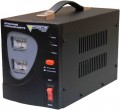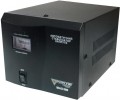Input voltage range
The voltage range at the input of the stabilizer, at which it is able to operate in normal mode and supply a constant voltage of 230 or 400 V to the load (depending on the number of phases, see above). The wider this range — the more versatile the device, the more serious power surges it can extinguish without going beyond the standard operating parameters. However, note that this parameter is not the only, and not even far from the main indicator of the quality of work: a lot also depends on the accuracy of the output voltage and the response speed (see both points below).
Also note that some models may have several modes of operation (for example, with 230 V, 230 V or 240 V output). In this case, the characteristics indicate the "general" input voltage range, from the smallest minimum to the largest maximum; the actual ranges for each particular mode will vary.
In addition, there are stabilizers that can operate outside the nominal input voltage range: with a slight deviation beyond its limits, the device provides relatively safe output indicators (also with some deviations from the nominal 230 or 400 V), but if the drop or rise becomes critical, it works appropriate protection (see below).
Grounded sockets
The number of
sockets for 230 V with grounding provided in the design of the stabilizer.
Some electrical appliances, such as refrigerators and washing/dishwashers, must be grounded when connected. This point should not be ignored — there is a risk of a serious electric shock. Accordingly, the number of sockets with grounding corresponds to the maximum number of such devices that can be simultaneously connected to the stabilizer without the use of splitters. At the same time, ungrounded devices can also be connected to such sockets.
IP protection rating
The degree of protection of the internal components of the stabilizer from various undesirable influences from the outside — first of all, from the ingress of moisture and foreign objects. The IP (ingress protection) standard is used to describe the protection provided by an enclosure.
In marking according to this standard, two digits are usually used — for example, IP54. The first digit describes the degree of protection against various solid objects (up to and including sand and dust). Its specific meanings may be as follows:
1 — protection against objects measuring 50 mm or more (for comparison: the average male fist will no longer pass even through the largest hole in such a case).
2 — from objects with a size of 12.5 mm or more (comparable to the thickness of a finger on a hand).
3 — from objects with a size of 2.5 mm or more (we can talk about protection against accidental contact with most standard tools).
4 — from objects with a size of 1 mm or more (for example, most wires).
5 — medium degree of protection against dust (it is allowed to get inside a certain amount of dust that does not affect the operation of the device).
6 — the maximum degree of protection against dust (its ingress is practically excluded).
The second digit, respectively, describes the resistance to moisture:
1 — minimum degree of protection — the device, placed in the working position, is resistant to individual drops falling vertica...lly on it.
2 — vertical drops are allowed when the device deviates from the working position by less than 15 °.
3 — splashes flying at an angle of up to 60 ° from the vertical are allowed; rain protection.
4 — resistance to splashes from any direction; wind and rain protection.
5 — resistance to water jets; protection from heavy rains, storms.
6 — short-term ingress of large volumes of water is allowed — for example, when a wave hits.
7 — the possibility of short-term immersion under water to a shallow depth (up to 1 m).
8 — the ability to work at a depth of 1 m and for a longer time.
One of the numbers can be replaced by the letter X — this usually means that the device does not have official certification in the corresponding direction of protection. In some cases, this suggests that there is no such protection at all — for example, the IP2X case is most likely not designed for any water ingress at all. However, it can be the other way around — for example, IPX7: a housing with the ability to submerge under water will certainly be well protected from dust, even if this is not officially announced.
Of course, it is worth choosing an option for this parameter, first of all, taking into account the expected operating conditions: for example, for a dry utility room, water protection is useless (it will only cost extra money), but in a damp basement, such a case can be very out of place. However, note that no protection provides absolute guarantees and does not eliminate the need to comply with safety rules.
Carrying handle
The presence in the design of the stabilizer of a special
handle for carrying the device from place to place. This feature is useful primarily for powerful and, accordingly, heavy devices, which would be inconvenient to hold directly by the case. And in the most "weighty" models, which are not designed to be carried alone, there are several handles.

